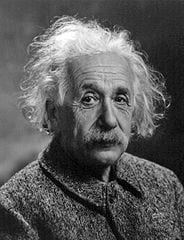The Search for Genius: Einstein’s Brain
By news editor, on 15 March 2012
 Dr Mark Lythgoe (UCL Centre for Advanced Biomedical Imaging) took the audience of his Lunch Hour Lecture on 13 March on a journey to explore the greatest brain of the 20th century. The lecture to mark Brain Awareness Week drew in a large crowd; potentially explained by the promise of seeing a real brain!
Dr Mark Lythgoe (UCL Centre for Advanced Biomedical Imaging) took the audience of his Lunch Hour Lecture on 13 March on a journey to explore the greatest brain of the 20th century. The lecture to mark Brain Awareness Week drew in a large crowd; potentially explained by the promise of seeing a real brain!
The journey began with a video clip of Dr Lythgoe and Dr Jim Al-Khalili from the programme The Riddle of Einstein’s Brain (Channel 4, National Geographic USA, 2005). The two presenters were getting into a red convertible in southern California and setting off in search of the brain of Albert Einstein.
The presenters could not agree, however, on where genius originates from and consequently where it can be found. Is genius determined by biology and therefore can Einstein’s brain show us how? Or is genius a culturally dependent term that lives in the ideas produced?
Dr Lythgoe threw the question to the audience: “Did Einstein need to have published his work to be considered a genius? Or if he had done exactly the same amount of work and drawn the same conclusions, but never published, would he still be a genius?”
 Close
Close

